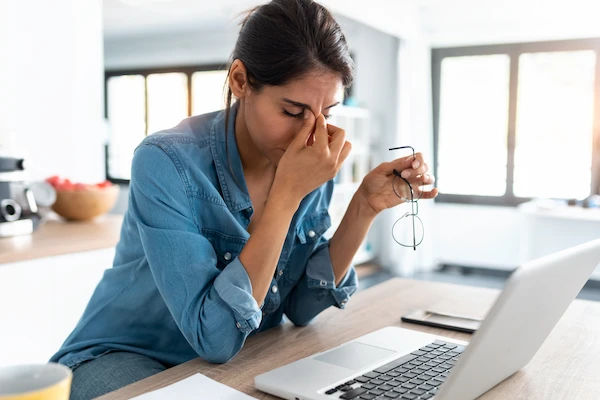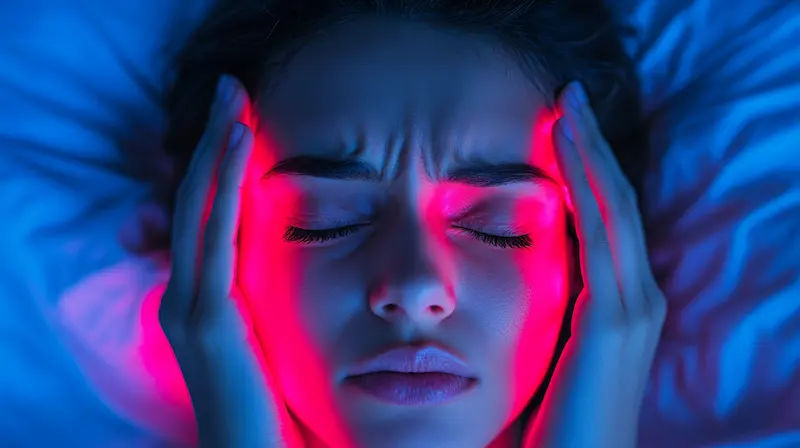Guide to Connection Between Stress And Migraine
Discover the link between stress and migraines, why it creates a vicious cycle, and how to break free. Learn the science, identify triggers, and explore practical strategies to manage stress, reduce migraine attacks, and regain control.

Written by Dr. Dhankecha Mayank Dineshbhai
Reviewed by Dr. Shaik Abdul Kalam MD (Physician)
Last updated on 13th Jan, 2026

If you’ve ever felt a throbbing, debilitating migraine come on during a crushing deadline or after a particularly tense argument, you’ve experienced the undeniable link between stress and migraine firsthand. You are not alone. Stress is consistently ranked as one of the most common triggers for migraine attacks, but the relationship is far more complex than a simple cause-and-effect. It’s a vicious, self-perpetuating cycle: stress triggers a migraine, the pain and disruption of the migraine create more stress, which in turn makes you more susceptible to the next one. This article will demystify the powerful connection between stress and migraine. We’ll explore the fascinating neuroscience behind why stress causes head pain, help you identify your unique triggers, and, most importantly, provide you with a practical toolkit of evidence-based strategies to manage stress, reduce migraine frequency, and finally break the cycle for good.
How Does Stress Actually Trigger a Migraine? The Science Explained
Understanding the "why" can be the first step toward empowerment. A migraine isn't just a bad headache; it's a complex neurological event. When stress enters the picture, it directly influences the brain's chemistry and pathways, setting the stage for an attack.
The Role of the Hypothalamus: Your Brain's Command Center
Think of the hypothalamus as your body's mission control for stress and homeostasis. It regulates your sleep-wake cycle, hormones, and autonomic nervous system (which controls your "fight-or-flight" response). In people with migraine, the hypothalamus is believed to be inherently more sensitive. When stress occurs, the hypothalamus goes into overdrive, sending out chaotic signals that can disrupt normal brain function and initiate the cascade of events leading to a migraine. This is also why migraines are often so predictable, linked to hormonal shifts, sleep changes, and stress—all processes governed by the hypothalamus.
Cortisol and CGRP: The Chemical Culprits
In response to stress, your body releases hormones like cortisol and adrenaline. While helpful in short bursts, chronic stress can lead to dysregulated cortisol levels, promoting inflammation and exciting the nervous system. Furthermore, stress triggers the release of a key neurotransmitter called Calcitonin Gene-Related Peptide (CGRP). CGRP causes blood vessels in the brain to dilate (widen) and promotes inflammation around the nerves, which is a primary source of migraine pain. Modern migraine-specific treatments, like CGRP inhibitors, work by blocking this very molecule,
underscoring its critical role.
Identifying Your Personal Stress Triggers
Not all stress is a dramatic, life-altering event. Often, it's the slow accumulation of daily hassles that pushes the nervous system over the edge.
Everyday Hassles vs. Major Life Events
Major life events like moving, changing jobs, or financial worries are obvious triggers. However, don't underestimate
the power of micro-stressors: a long commute, a noisy work environment, constant notifications on your phone, or even skipping a meal. Keeping a migraine diary can be invaluable for spotting patterns. Note not just your stress levels, but also your sleep, diet, and hydration around the time a migraine starts.
The "Let-Down" Migraine: When You Finally Relax
Perhaps the most frustrating phenomenon is the "let-down" or "weekend" migraine. After a period of intense stress (e.g., a difficult week at work), when you finally relax, a migraine strikes. This happens because cortisol levels, which were high and potentially masking pain, suddenly drop. This rapid shift in biochemistry can be the trigger itself. It’s not that relaxation is bad; it’s the sudden change in stress levels that the sensitive brain reacts to.
Proven Strategies to Manage Stress and Reduce Migraines
Breaking the cycle requires a two-pronged approach: reducing overall background stress and having tools to manage it in the moment.
Lifestyle Modifications: Building a Resilient Foundation
You cannot control all stress, but you can control your foundation of health, making your brain more resilient.
Prioritizing Sleep Hygiene
Aim for 7-8 hours of consistent, quality sleep. Go to bed and wake up at the same time every day, even on weekends.This stabilizes your hypothalamus and reduces one of the biggest migraine triggers.
The Power of Regular Exercise
Moderate, consistent exercise like brisk walking, swimming, or yoga is a powerful stress reliever. It releases endorphins (natural painkillers), improves sleep, and reduces anxiety. The key is consistency, not intensity, as overexertion can sometimes be a trigger.
Nutrition and Hydration Tips
Avoid skipping meals, as low blood sugar is a common trigger. Stay hydrated throughout the day. While specific food triggers are individual (e.g., aged cheese, processed meats), a generally stable diet helps regulate your system.
Mind-Body Techniques: Calming the Nervous System
These techniques work directly on your nervous system, teaching it to shift from "fight-or-flight" to "rest-and-digest."
Mindfulness and Meditation Practices
Studies show that regular mindfulness meditation can reduce migraine frequency and severity. It doesn't stop thoughts
but changes your relationship to them, reducing the secondary stress.
Deep Breathing Exercises for Immediate Relief
When you feel stress building, try the 4-7-8 technique: Inhale for 4 seconds, hold your breath for 7 seconds, and exhale slowly for 8 seconds. This activates the parasympathetic nervous system, forcing your body to calm down.
Cognitive Behavioral Therapy (CBT) for Migraines
CBT is a structured therapy that helps you identify and change negative thought patterns and behaviors that exacerbate stress and pain perception. It is one of the most effective non-pharmaceutical methods for managing chronic migraine, as it provides practical tools to dismantle the stress-pain cycle.
When to Seek Professional Help
While self-management is crucial, there are times when professional guidance is essential. If your migraines are frequent (more than 4-5 days a month), severe, or significantly impacting your quality of life, it's time to see a doctor. If your condition does not improve after trying these methods, book a physical visit to a doctor with Apollo24|7 for a comprehensive evaluation. They can help diagnose your specific migraine type, rule out other causes, and discuss preventive and abortive prescription medications that can be life-changing. For some, managing underlying anxiety might also be a key part of the solution, and a professional can guide you there.
Conclusion
The connection between stress and migraine is profound, but it is not a life sentence. By understanding the biological mechanisms at play, you can stop blaming yourself and start implementing strategic changes. Remember, the goal isn't to eliminate all stress—that's an impossible task. The goal is to build a more resilient nervous system through consistent lifestyle habits, practical mind-body tools, and professional support when needed. You have the power to disrupt the cycle. Start with one small change, whether it's a daily 10-minute walk, downloading a meditation app, or simply committing to a more regular sleep schedule. Each positive step strengthens your defense against stress and empowers you to take back control from migraine.
Consult a Specialist for the best advice
Consult a Specialist for the best advice

Dr. Rajib Ghose
General Physician/ Internal Medicine Specialist
25 Years • MBBS
East Midnapore
VIVEKANANDA SEBA SADAN, East Midnapore

Dr. S Vijayaraghavan
General Physician/ Internal Medicine Specialist
31 Years • MD (Gen. Med.)
Chennai
Apollo Speciality Hospitals OMR, Chennai
(175+ Patients)

Dr. Dhanraj K
General Physician/ Internal Medicine Specialist
25 Years • MBBS, MD Internal Medicine - Osmania Medical College, Hyderabad
Hyderabad
Apollo Hospitals Jubilee Hills, Hyderabad
(400+ Patients)

Dr. Sudhashree R
General Physician/ Internal Medicine Specialist
13 Years • MBBS, MRCEM
Bengaluru
Apollo Clinic, JP nagar, Bengaluru

Dr. Arif Ahmed
General Physician/ Internal Medicine Specialist
9 Years • MBBS, MD (Genl. Med.)
Kolkata
MCR SUPER SPECIALITY POLY CLINIC & PATHOLOGY, Kolkata
More articles from Stress
Frequently Asked Questions
Q1. What is the difference between a stress headache and a migraine?
While both can be caused by stress, a typical tension headache usually feels like a constant, dull ache or pressure around the head. A migraine is a neurological disease often featuring throbbing pain on one side, sensitivity to light and sound (photophobia and phonophobia), nausea, and can be disabling.
Q2. Can reducing anxiety help with migraines?
Absolutely. Since anxiety is a state of persistent stress and worry, it keeps the nervous system in a heightened state of alert, lowering your threshold for a migraine attack. Effectively managing anxiety through therapy, medication, or lifestyle changes can significantly reduce migraine frequency.
Q3. What is the fastest way to get rid of a stress migraine?
For immediate relief, combine methods: take your prescribed abortive medication at the first sign, retreat to a dark, quiet room, apply a cold compress to your head or neck, and practice deep breathing exercises to calm your nervous system.
Q4. Why do I get migraines on vacation or weekends?
This is a classic 'let-down' or 'weekend' migraine. After a period of high stress, the sudden drop in cortisol levels can trigger an attack. It's not the relaxation itself but the drastic biochemical shift that acts as a trigger.
Q5. Are there any tests to prove stress is causing my migraines?
There is no single test to diagnose stress as the cause. Diagnosis is based on clinical history, which is why a migraine diary is so valuable. A doctor will use your reported patterns and symptoms to identify stress as a key trigger and rule out other underlying conditions.




